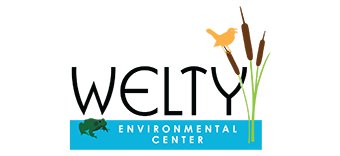Welty’s Distance Learning Field Trips
Schools, this post is for you! This year is very different. I hope that all of you are doing well and finding ways to engage your learners. The Welty Environmental Center would like to help support you in any way that we can.
Through our partnerships, Welty has had the opportunity to develop a few elementary distance-learning field trips that could support the curriculum with which you are engaging your students. Take a look at these descriptions and see what might work for your classroom. We are also offering School Scholarship assistance, listed afterwards.
(An example of a virtual learning experience from Welty’s YouTube channel)
Forest Ecology (designed for 2nd, but could be used for K – 4th) Learners will enjoy a trip into the forest to discover producers, consumers, and decomposers and how they work together. They will learn ecological vocabulary and draw a diagram to help reinforce concepts, and watch our turtles eat worms and celery. The followup materials include a self-guided neighborhood BINGO hike, understanding what type of consumer they are, and the option to build a mini worm compost bin.
Welty has developed elementary distance-learning field trips…
Wisconsin Wolves (designed for 3rd, but could be used for 2nd – 5th) Learners will learn about where wolves are located in Wisconsin in relation to Beloit, compare wolves with coyotes, experience what wolves need in their habitat (draw with me). The followup materials include a wolf tracking exercise, a neighborhood habitat exploration, and the Ojibwe story of Ma’iingan.
…to show how fun it is to be curious and the magic of practicing curiosity.
Big Hill Geology (designed for 4th, but could be used for 3rd – 5th) Learners will delve into the Ordovician Era of 450 million years ago, as it pertains to Wisconsin’s Big Hill Park in Beloit, WI. They will search for fossils and learn how rocks can change over time, and how tectonic plates are always shifting. The followup materials include a tectonic puzzle, an at-home sediment experiment, the life of a rock, and supporting Wisconsin maps.
Turtles to Go (designed for Library Story Times, but could be used for K – 3rd) Participants will discover Welty’s Red-eared Sliders, learn their external anatomy, do turtle crafts, and watch them eat. Post-viewing materials include Wisconsin DNR’s turtle help guide, coloring, and a neighborhood scavenger hunt.
Pressed Plant Journals (designed for Library Story Times, but could be used for 2nd – 6th) Budding botanists will engage in creating their own pressed plant journal, learn about identification, and how to hammer plants to create a print. Extra materials include a journal template and a neighborhood scavenger hunt.
Wonderful Worms (designed for Library Story Times, but could be used for K – 2nd) For the wiggle ones, this program digs deep into what worms like to eat, their anatomy, and how to set up your own compost bin. This one is definitely for the younger crowd and the young at heart (it is a bit goofy and we talk about poop!) The extra materials include how to set up your own worm home, coloring, and a scavenger hunt.
If these programs are not what you are looking for, please contact us at info@weltycenter.org with your ideas. We are here to help and can work with you to design a program that supports your learning objectives.
Cost Discounted for schools–$50.00 per classroom! (Our usual in-person field trip rate is $90.00 for 90-minutes for up to 25 students and $5.00 per student over 25.) There are limited School Scholarship funds available through our DuPont CITF grant that could be used to help supplement school funds or pay for these trips. If interested, please contact us at info@weltycenter.org to see what is possible.
Again, thank you for all that you are doing for your students!
 Aaron Wilson
Aaron Wilson
Program Director, WEC
info@weltycenter.org
608-361-1377






